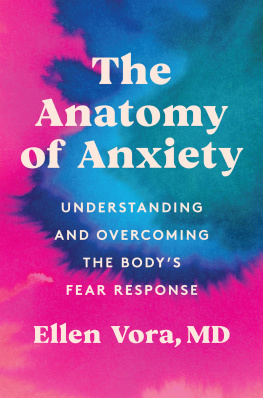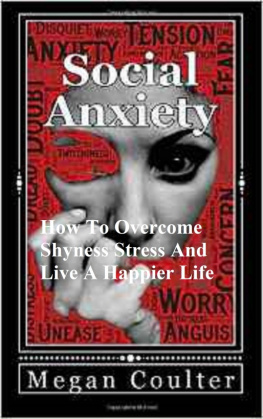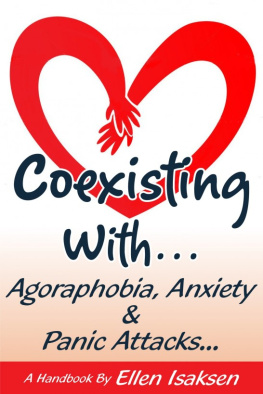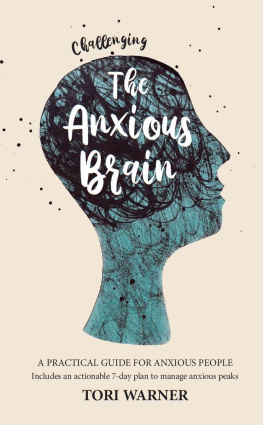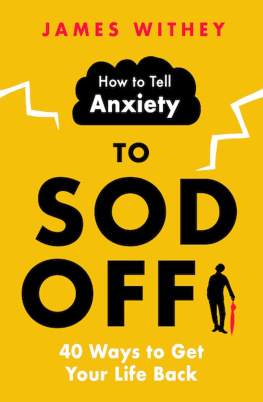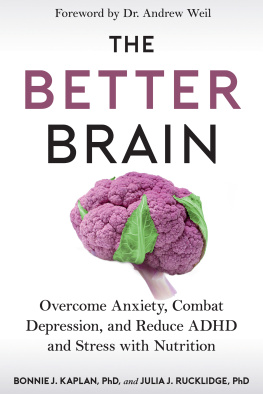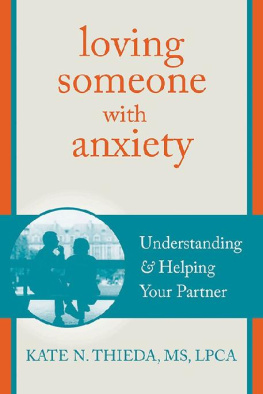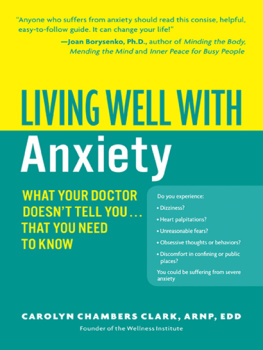This book contains advice and information relating to health care. It should be used to supplement rather than replace the advice of your doctor or another trained health professional. If you know or suspect you have a health problem, it is recommended that you seek your physicians advice before embarking on any medical program or treatment. All efforts have been made to assure the accuracy of the information contained in this book as of the date of publication. This publisher and the author disclaim liability for any medical outcomes that may occur as a result of applying the methods suggested in this book. All identifying information, including names and other details, has been changed to protect the privacy of individuals. Any similarity to actual individuals or families is coincidental.
THE ANATOMY OF ANXIETY . Copyright 2022 by Ellen Vora. All rights reserved under International and Pan-American Copyright Conventions. By payment of the required fees, you have been granted the nonexclusive, nontransferable right to access and read the text of this e-book on-screen. No part of this text may be reproduced, transmitted, downloaded, decompiled, reverse-engineered, or stored in or introduced into any information storage and retrieval system, in any form or by any means, whether electronic or mechanical, now known or hereafter invented, without the express written permission of HarperCollins e-books.
Australia
HarperCollins Publishers Australia Pty. Ltd.
Level 13, 201 Elizabeth Street
Sydney, NSW 2000, Australia
www.harpercollins.com.au
Canada
HarperCollins Publishers Ltd
Bay Adelaide Centre, East Tower
22 Adelaide Street West, 41st Floor
Toronto, Ontario, M5H 4E3
www.harpercollins.ca
India
HarperCollins India
A 75, Sector 57
Noida
Uttar Pradesh 201 301
www.harpercollins.co.in
New Zealand
HarperCollins Publishers New Zealand
Unit D1, 63 Apollo Drive
Rosedale 0632
Auckland, New Zealand
www.harpercollins.co.nz
United Kingdom
HarperCollins Publishers Ltd.
1 London Bridge Street
London SE1 9GF, UK
www.harpercollins.co.uk
United States
HarperCollins Publishers Inc.
195 Broadway
New York, NY 10007
www.harpercollins.com
For my mom
Contents
We are on the cusp of a significant shift in how we view and treat mental health. Over the last several decades, the emerging fields of functional and integrative medicine, nutritional psychiatry, and even psychedelic therapy have shone a light on new paths to better mental health. These disciplines have demonstrated that issues wed once considered purely psychiatric in nature can be better understood as the result of a delicate yet highly consequential interplay of body and mind.
In my own work as a holistic psychiatrist, for instance, I examine the whole portrait of my patients livesfrom what they eat; to how they sleep; to the quality of their relationships; to where they find meaning, purpose, and refuge in their lives. In doing so, I have found that the anxiety that plagues so many of us is increasingly caused by the habits that are now intrinsic to our modern lives, such as chronic sleep deprivation, poor nutrition, and even doom scrolling on social media late into the night. Though these issues may seem too benign to significantly affect the mind, they are capable of creating a stress response in the body, which prompts the release of hormones such as cortisol and adrenalinesignaling a state of emergency to the brain that can leave us feeling anxious. In other words: physical health is mental health. And anxietythat hypervigilant feeling that escalates swiftly to a sense of catastrophe and doomis as grounded in the body as it is in the mind.
This paradigm shift is, in my view, as revolutionary as when selective serotonin reuptake inhibitors (SSRIs), a class of antidepressant medications including Prozac and Lexapro, were introduced a few decades ago. When these medications became the mainstream treatment for depression and anxiety, a clear medical model was presented for psychiatric disorders, and public mental health awareness grew. After centuries of stigma and shame, this came as an enormous relief; it offered the notion that our mental health struggles are not based on our personal failings but are essentially an expression of our brain chemistry. Now, however, given our increasing understanding of the profound mind-body connection, we have even more avenues to explore, in addition to medication, for addressing mental health. And in understanding that the body is as capable of informing our moods as the brain is, we have also come to realize that our anxiety is far more preventable than previously known. That is, through relatively straightforward adjustments to our diet and lifestyle, we can avoid unnecessary stress responses and head anxiety off at the pass.
There is, of course, a more profound anxiety that exists beyond the physiologicaland this feeling of uncertainty and unease cannot be addressed quite so easily. Ive found, however, that once Ive worked with my patients to eliminate the first layer of physical anxiety, the way is cleared for us to tap into this more penetrating distress. When my patients are able to discern the message of this deep-seated anxiety, they often find that it is their inner wisdom sending up a flare that something is out of alignment in their lives, either with their relationships or jobs or in the world at large. It sometimes speaks to our estrangement from community or nature; at other times, it points to a lack of self-acceptance or a keen awareness of the grave injustices happening around us. Exploring this anxiety allows us to excavate our intimate truths. And more often than not, these revelations offer a call to action as well as an opportunity to turn a feeling of profound disquiet into something purposeful.
In this sense, whether its the consequence of our habits or a missive from our inner psyche, anxiety is not the final diagnosis but rather the beginning of our inquiry. That is, anxiety is not whats wrong with youit is your body and mind fiercely alerting you to the fact that somethingelse is wrong. It is evidence that there is something out of balance in your body, mind, life, or surroundingsand with curiosity and experimentation, you can work toward putting these elements back into balance. The path forward begins with identifying the root cause, whether it is the result of an everyday habit or a sense of profound unease or both.
I come by these revelations honestly. My years in medical school at Columbia University and my psychiatry residency at Mount Sinai were not halcyon days for me, largely because my arduous training was complicated by my own mental and physical health problems. I struggled with mood as well as digestive, hormonal, and inflammatory issuesproblems that I now know conventional medicine is fundamentally ill equipped to address.
It took me years to regain balance within my body and life. Ultimately, in the final year of my psychiatry residency, desperate to bring more meaning to my work as well as to discover a way to heal myself, I began studying alternative approaches to health in addition to my rotations at the hospital. When I wasnt working overnight on the wards, I attended acupuncture school and then took shifts administering acupuncture to patients at an addiction clinic in the Bronx; I used my elective time to complete the integrative medicine training at Andrew Weils center at the University of Arizona and then had a mentorship with an integrative psychiatrist back in New York; I apprenticed with a hypnotherapist; I undertook intensive yoga teacher training in Bali, where I was also introduced to Ayurveda; and, in time, I went on to study functional medicine and explore psychedelic medicine and its potential implications for psychiatry.

